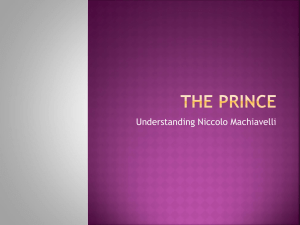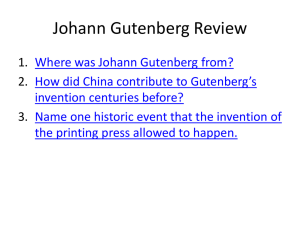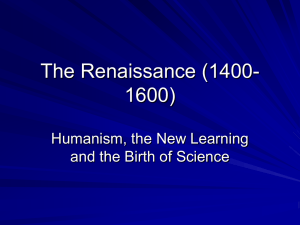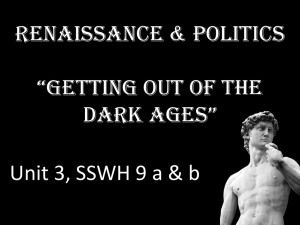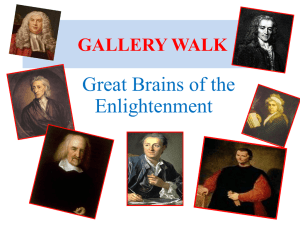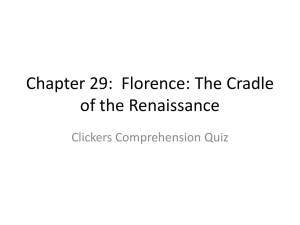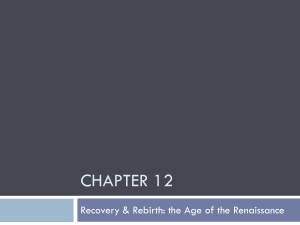Modern Man - Lehrstuhl Prof. Dr. iur. Dr. rer. pol. Dr. hc Christian
advertisement
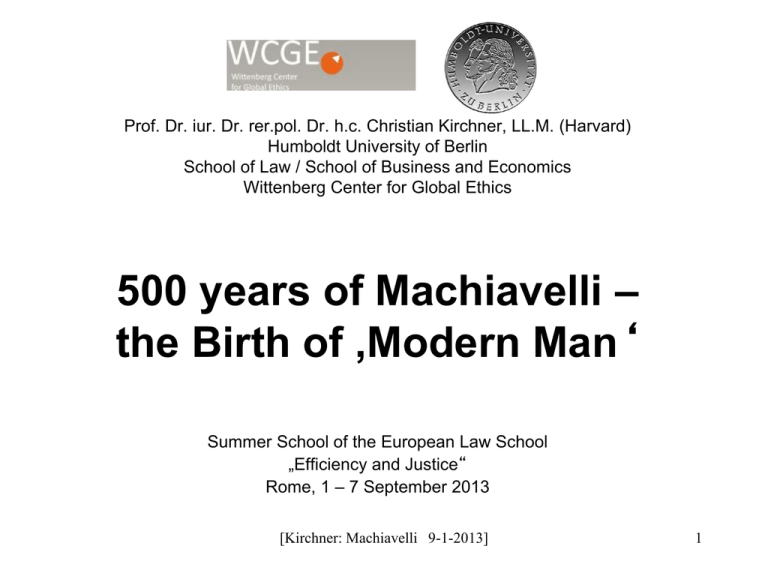
Prof. Dr. iur. Dr. rer.pol. Dr. h.c. Christian Kirchner, LL.M. (Harvard) Humboldt University of Berlin School of Law / School of Business and Economics Wittenberg Center for Global Ethics 500 years of Machiavelli – the Birth of ‚Modern Man‘ Summer School of the European Law School „Efficiency and Justice“ Rome, 1 – 7 September 2013 [Kirchner: Machiavelli 9-1-2013] 1 1. Introduction (1) 1.1 Provocations 500 years Machiavelli = 500 years of realism in politicial theory 500 years emancipation of political theory from theology and moral philosophy Birthday of methodological innovation / Machiavelli the Galileo of social sciences Breakthrough of the homo oeconomicus-assumption In the context of ‚efficiency and justice‘: re-adjusting the compass from justice to efficiency [Kirchner: Machiavelli 9-1-2013] 2 1. Introduction (2) 1.2 Controversial positions ‚violent disparity of judgements‘ Extreme positions: Frederick the Great of Prussia called Machiavelli „the enemy of mankind“. Marx calls ‚The Discourses‘ a genuine master piece. For Bacon, Machiavelli is the supreme realist. The question here: Machiavelli‘s position as the ‚birth of modern man‘? [Kirchner: Machiavelli 9-1-2013] 3 1. Introduction (3) 1.3 Personal Reservation Living in Berlin Born in Potsdam Working for a Thinktank in Business Ethics (Wittenberg Center for Global Ethics) Interest in the ‚Anti-Machiavell‘ of Frederick the Great of Prussia But the Antimachivell was written by the crown prince whereas the later king acted more in Machiavellian fashion [Kirchner: Machiavelli 9-1-2013] 4 1. Introduction (3a) [Kirchner: Machiavelli 9-1-2013] 5 1. Introduction (3b) [Kirchner: Machiavelli 9-1-2013] 6 1. Introduction (4) 1.4 Different approaches (1) (2) Machiavelli: the inventor of the ‚modern man‘ Machiavelli: a plagiator, copying positions of classical writers in the tradition of poltical realism In the absence of a model of ‚modern man‘, Machiavelli could not invent such a model Machiavelli: a fore-runner of the rational choiceapproach, where homo oeconomicus stands for ‚modern man‘ Machiavelli: inventor of a heuristic model of ‚modern man‘ (3) (4) (5) [Kirchner: Machiavelli 9-1-2013] 7 1. Introduction (5) 1.5 Concept of the lecture Looking at Niccoló Machiavelli through the lenses of the modern – modified – homo oeconomicus-assumption [Kirchner: Machiavelli 9-1-2013] 8 2. Methodological Notes (1) In social sciences, behavioural assumptions are heuristic instruments Two components of the homo oeconomicusassumption self-interested behaviour (refering to goals) rational decision making (refering to methods of how to reach the goals) Assumption of self-interested behaviour modified by fairness- and empathy-assumptions Rationality assumption modified in behavioural economics → ‚bounded rationality‘ Modern homo oeconomicus: qualified rational choice model [Kirchner: Machiavelli 9-1-2013] 9 2. Methodological Notes (2) Distinction between ‚decisions within rules‘ and ‚decisions on rules‘ ‚Decisions within rules‘ under competitive conditions: necessity of acting self-interested and rational (non-cooperative games) Dilemma structure: those who do not act selfinterested and rational may be exploited by other actors ‚Decisions on rules‘: collective action problems (high decision making costs) → reduction of decision making costs by entering cooperative games → role of fairness and empathy Distinction between ‚non-cooperative games‘ and ‚cooperative games‘ [Kirchner: Machiavelli 9-1-2013] 10 3. Three Hypotheses (1) (1) ‘Il Principe’ is focusing on ‘decisions within rules’ whereas ‘Il Discorsi’ is focusing on ‘decisions on rules’. (2) ‘Il Principe’ is neglecting transaction costs and options for cooperative games. (3) ‘Il Discorsi’ is focusing on solutions and is underestimating meta-rules for decisionmaking. [Kirchner: Machiavelli 9-1-2013] 11 4. Reception of Machiavelli (1) (1) (2) (3) (4) (5) Print of ‘Il Principe’ 1532 in the Vatican (Clemens VII) ‘Il Principe’ put on the Index of Prohibited Books in 1559 (Paul IV) Bacon: Machiavelli as a forerunner of empiricism Frederick the Great of Prussia Machiavelli „the enemy of mankind“ Cassirer: Machiavelli an objective analyst of politics, morally neutral [Kirchner: Machiavelli 9-1-2013] 12 4. Reception of Machiavelli (2) (6) (7) (8) Pocock: Machiavelli's republicanism is of a civic humanist variety whose roots are to be found in classical antiquity Croce: Machiavelli a "realist" or "pragmatist“, who accurately states that moral values in reality do not greatly affect the decisions that political leaders make Viroli: Machiavelli is applying and refining classical political wisdom in the tradition of Roman scientia civilis [Kirchner: Machiavelli 9-1-2013] 13 5. The puzzle of the Machiavelli-interpretation ▪ Different perspectives and concepts in different works of Machiavelli ▪ Machiavelli in the tradition of classical political thought (with new accents) ▪ Machiavelli as fervent patriot (last chapter of ‘Il Principe’) ▪ Machiavelli’s republican ideals (in ‘Il Discorsi) ▪ Rafael Major (2007),172: Machiavelli‘s writing is rich enough to support virtually and thesis ▪ The thesis of Machiavelli being the creator of ‘modern man’ evidently cannot be supported in the light of that puzzle [Kirchner: Machiavelli 9-1-2013] 14 6. Il Principe (1) ▪ Concept: Explaining instruments for acquiring and retaining absolute (dictatorial) power under given political and military conditions in Italy in the 16th century ▪ Behavioural assumption: self-interested behaviour of all actors (including citizens) (Chapter XIV, first sentence) ▪ Normative analysis (advice for princes! – and for citizens?), which can be read as a positive analysis explaining how various instruments work, abstaining from bringing into play moral values (Chapter XV, second passage: “Hence, is it necessary for a prince whishing to hold his own how to do wrong, and to make use of it or nut according to necessity.”) [Kirchner: Machiavelli 9-1-2013] 15 6. Il Principe (2) ▪ Dilemma structures prevent success of strategies based on moral values (Chapter XI, end of first passage: “..; for a man who wishes to act entirely up to his professions of virtue soon meets with what destroys him among such much that is evil.” ▪ Historical examples as a proof for the success of wicked and immoral strategies (Chapter VIII: Agathocle, King of Syracuse (Sicily) [Kirchner: Machiavelli 9-1-2013] 16 6. Il Principe (3) ▪ Concept of ‘virtú’ (not to be translated with ‘virtue’ and its connotation of moral goodness): range of personal qualities necessary to acquire and retain power (Nedermann, 2009, 4) ▪ Concept of ‘fortuna’ (not to be translated with ‘fortune’ bat rather with ‘fate’, ‘lot’ or ‘doom’); unforeseeable, changing circumstances which have an impact on success or failure (to acquire and retain power) [Kirchner: Machiavelli 9-1-2013] 17 7. Il Discorsi ▪ Concept: explaining, how to organise states and governments ▪ Historical examples for illuminating hypotheses on successful of not successful organisation of states and governments ▪ Normative tendency: favouring the republic organisation of the state ▪ Positions in line with many classical political writers [Kirchner: Machiavelli 9-1-2013] 18 8. Different concepts in ‚Il Principe‘ and ‚Il Discorsi‘ (1) ▪ ‘Il Principe’: ▫ advice to actors which have to make decisions within a given framework (e.g. wars between Italian city states; wars with France and Spain, civil wars) ▫ ‘fortuna’ is standing for such circumstances which cannot be changed by the Prince ▫ ‘fortuna’ is standing for the lack of predictability of changing circumstances [Kirchner: Machiavelli 9-1-2013] 19 8. Different concepts in ‚Il Principe‘ and ‚Il Discorsi‘(2) ▪ ‘Il Principe’ (cont’d) ▫ ‘virtue’ is standing for rational planning and decision making (means and ends-paradigm) ▫ Translated into modern rational choiceterminology: In ‘Il Principe’, Machiavelli is engaged in a positive analysis of strategies of self-interested and rational actors which have to act under systematic incomplete information [Kirchner: Machiavelli 9-1-2013] 20 8. Different concepts in ‚Il Principe‘ and ‚Il Discorsi‘(3) ▪ ‘Il Discorsi’: ▫ advice for citizens (or a dictator) how to organise states and governments (positive and normative analysis) ▫ normative fundament: classical republican values of liberty and rule of law ▫ Dilemma: dictators are allegedly in a better position to organise republican states (Machiavelli as predecessor of Thomas Hobbes) [Kirchner: Machiavelli 9-1-2013] 21 9. Solving the puzzle (1) ▪ In ‘Il Principe’, Machiavelli is a forerunner of a – simple – rational choice approach, utilising the homo oeconomicus-assumption. ▪ The Prince has to act as if he were homo oecomicus to be successful. ▪ In ‘Il Discorsi’, citizens have to agree of how to organise state and government. ▪ They have choices and can make normative decisions. ▪ Morals come into play, not as objective values, but as agreed values (hypothetical consent) [Kirchner: Machiavelli 9-1-2013] 22 9. Solving the puzzle (2) ▪ The Machiavelli-Puzzle is comparable to the Adam Smith-Problem (different behavioural assumptions in “The Wealth of Nations” and “Theory of Moral Sentiments”: people have to act as if they were hominess oecnomici in markets but not in institution-building) [Kirchner: Machiavelli 9-1-2013] 23 10. Conclusions (1) ▪ Machiavelli is in line with ‘modern manassumption’ by distinguishing between ‘advice for making decisions within rules’ and ‘proposal to make decisions on rules’ ▪ Deficit in ‘Il principe’: overemphasizing a simplified model of self-interested behaviour, neglecting transaction costs and potentials for the introduction of cooperative games ▪ Deficit in ‘Il Discorsi’: underemphasizing the collective action problems and meta-rules for decision making [Kirchner: Machiavelli 9-1-2013] 24 10. Conclusions (2) ▪ Machiavelli has introduced essential elements of the rational choice-approach (with certain shortcomings) ▪ ‘Modern Man’ can no longer be equalized with the ‘rational choice-approach’ ▪ Machiavelli is not the father of ‘modern man’, but may be an uncle. [Kirchner: Machiavelli 9-1-2013] 25
